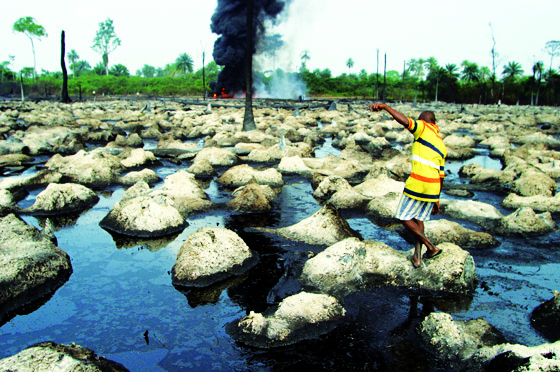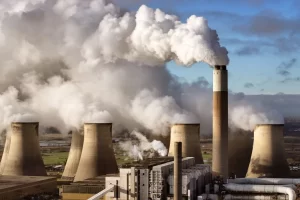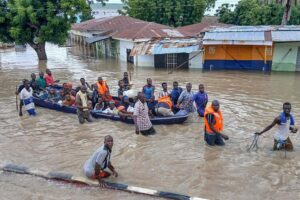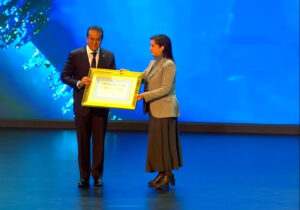
A man walks through the farm land damaged by oil spill in Rukpokwu, near the oil city of Port Harcourt, Nigeria, Thursday, Jan. 8, 2003. Ruptured oil pipeline belonging to Shell Petroleum Development Company SPDC exploded damaging about 200 hectares of community farmlands, with oil spillage polluting fishing ponds and rendering many village farmers jobless. (AP Photo/George Osodi)
In a stern indictment, stakeholders have levelled accusations against Western banks, asserting that their support for oil companies in the Niger Delta is exacerbating environmental degradation and posing a threat to community leaders.
This assertion emerged from a comprehensive communiqué signed by representatives of various committees, including the Nigerian Bar Association, Citizens Advocacy for Social and Economic Rights, and traditional rulers, following a roundtable meeting hosted by ActionAid Nigeria (AAN) in Asaba, Delta State.
The stakeholders emphasized the imperative for a dedicated carbon gas desk for all multinational corporations, highlighting the need to hold them accountable for their environmental impact.
The meeting underscored concerns about poverty and divide-and-rule tactics contributing to the collaboration between Western banks and oil companies, leading to adverse consequences for the Niger Delta region.
Expressing dissatisfaction with the apparent lack of political will among Nigerian leaders to implement effective climate change policies, the stakeholders called for a decisive shift towards renewable energy sources.
They advocated for stringent penalties to be imposed on oil companies engaged in gas flaring and criticized prevalent issues such as deforestation and waste in water channels.
Furthermore, the stakeholders demanded the enforcement of existing regulations aimed at addressing anomalies associated with oil exploration in the Niger Delta.
The stakeholders endorsed the cultivation of positive working relationships among community leaders, oil companies, and the government.
They emphasized the urgent need for the proper cleanup of areas impacted by oil spills in the Niger Delta, stressing the importance of collective responsibility in mitigating environmental hazards.
Recommendations from the meeting included urging the Nigerian government to access global environmental funds and facilitate dialogues with stakeholders affected by oil exploration in Niger Delta communities.
The stakeholders encouraged a strong synergy between the government, oil companies, and local communities, advocating for the strategic use of existing laws to safeguard the interests of host communities in dealings with multinational corporations.
This communiqué represents a united call for accountability, environmental responsibility, and sustainable practices in the face of the complex challenges posed by oil exploration in the Niger Delta.








